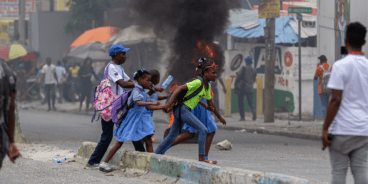Atrocity Alert No. 97: Syria and the Philippines
Atrocity Alert is a weekly publication by the Global Centre for the Responsibility to Protect highlighting situations where populations are at risk of, or are enduring, mass atrocity crimes.
Civilians in Afrin and eastern Ghouta pay for UN Security Council inaction
As the Syrian civil war enters its eighth year, civilians in Afrin and eastern Ghouta are facing war crimes and mass displacement. Over 100,000 people fled the northern city of Afrin before its capture by Turkish-backed forces on Sunday, 18 March. According to the Syrian Observatory for Human Rights, on 16 March Turkish airstrikes damaged Afrin city’s largest hospital, killing 16 people, and the UN Office for the Coordination of Humanitarian Affairs has reported that 48 schools within Afrin district have been damaged due to fighting. There are grave concerns for the fate of ethnic Kurdish civilians at the hands of the Turkish-backed forces now occupying Afrin.
Separately, in the past week over 50,000 people have fled eastern Ghouta where the Syrian government’s offensive has killed more than 1,400 people in just over a month. On Tuesday, 20 March, 15 children were killed in an airstrike as they hid in the basement of a school in the town of Arbin. On the same day at least 44 people were killed in Damascus when an armed opposition group operating in eastern Ghouta fired a mortar into the crowded Kashkoul market during rush hour. According to the Syrian Civil Defense, at least 56 civilians have also been killed by Russian and Syrian government airstrikes on the town of Douma since Monday.
Over 380,000 people remain in need of emergency humanitarian aid within eastern Ghouta, which has been besieged by Syrian government forces since 2013. On 19 March the UN High Commissioner for Human Rights, Zeid Ra’ad Al-Hussein, described the government’s military tactics as having involved “pervasive war crimes, the use of chemical weaponry, enforced starvation as a weapon of warfare, and the denial of essential and life-saving aid.”
The High Commissioner delivered these remarks during an informal meeting with UN Security Council members on the human rights situation in Syria, following a successful attempt – led by Russia – to block him from formally briefing the Council. This sets a dangerous precedent for the Security Council, suggesting that the ongoing perpetration of war crimes and crimes against humanity in Syria is not considered pertinent to the maintenance of international peace and security.
The Security Council remains incapable of taking action to halt atrocities in Syria, despite the fact that the conflict has lasted more than seven years and killed over half a million people. The Security Council must follow up on the failure of the Syrian government and its allies to comply with Resolution 2401 and establish a sustained ceasefire. In addition, the Council should urgently mandate the deployment of UN monitors to oversee civilian evacuations and aid deliveries to eastern Ghouta and Afrin, and to deter further human rights abuses.
Fearing accountability for 9000+ extrajudicial killings, President Duterte withdraws from the ICC
On 14 March the spokesperson for President Rodrigo Duterte declared that the Philippines is withdrawing from the International Criminal Court (ICC). This move comes just one month after the Prosecutor of the ICC, Fatou Bensouda, announced the opening of a preliminary examination into whether widespread extrajudicial killings carried out during President Duterte’s so-called “war on drugs” may constitute crimes against humanity. Over 9,000 people have been killed since 1 July 2016 for their alleged involvement with illegal drugs.
A preliminary examination is an initial legal step to determine whether there is a reasonable basis to proceed with a formal ICC investigation. Despite the Philippines’ notice of withdrawal from the ICC, which will become effective one year after submission, the ICC retains jurisdiction over international crimes committed during the time the Philippines was party to the Rome Statute.
President Duterte has publicly vowed to protect police and armed vigilantes accused of extrajudicial killings. Other high-ranking government officials have echoed these sentiments, including the Justice Secretary, who has declared that the murder of suspected drug dealers cannot be considered crimes against humanity as such people are not “part of humanity.” Despite numerous bellicose statements, President Duterte previously insisted that he would cooperate with any ICC investigation.
While the government of the Philippines has sovereign authority to maintain law and order within its borders, including by punishing those who deal in illegal drugs, it is obligated to do so with respect to International Human Rights Law. States with strong economic and political ties to the Philippines must urge the government to restore the rule of law and immediately halt widespread extrajudicial killings.
Read Next
Related Publications

Atrocity Alert No. 436: Haiti, Myanmar (Burma) and Syria

Atrocity Alert No. 434: Sudan, Ethiopia and the UN Human Rights Council
